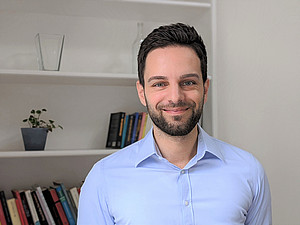The Department as a guest
Short interviews with members of the institute who are guests elsewhere
Thomas Pölzler
What is your role at the Department of Philosophy in Graz?
Until recently, I was employed as a university assistant and project researcher at the section Practical Philosophy. Since October 5, 2023, I have been doing research abroad as part of a Marie Skłodowska-Curie project.

What are you researching?
I am interested in both fundamental questions and applications of practical philosophy. For example, I address the possible objectivity of morality, the methods of ethics and our obligations with regard to climate change. I usually approach these topics from an interdisciplinary perspective. This also applies to my current research project, in which I am using methods from both philosophy and psychology. The project is about impartiality in moral reasoning. Specifically, I am interested in whether a well-known philosophical thought experiment - the so-called "veil of ignorance" - is a suitable means of promoting impartiality. To what degree can we abstract from characteristics such as our gender, our ethnicity, our age, our wealth, etc.? How reliable and effective are such attempts in cultivating impartiality? And what implications do the answers to this question have for philosophical applications of the "veil" thought experiment?
Where are you currently visiting?
I am currently a guest at the University of Tokyo. The university has around 28,000 students and 4,000 employees and is considered the most renowned in Japan. Philosophy departments in Japan are less open to the outside world than those in many other countries. Their focus is also often clearly on continental philosophy. I am therefore all the happier to have a colleague here in Tokyo, Akira Inoue, who was immediately interested in working with me and is an expert in the field of my analytically oriented project. In addition to my stay in Japan (seventeen months), I will also be working at the Universities of Oxford (five months) and Wellington (two months) as part of the project.
How did this research stay come about?
I had already spent a year in Japan once before, funded by the Japanese Science Fund. Of course, living in a city of millions like Tokyo was a bit of an adjustment at first. I grew up in a small village in Eastern Styria. However, I quickly realized that I felt very comfortable in Japanese society. So I developed the desire to return there after this first stay. I therefore applied to the European Union for a global Marie Skłodowska-Curie scholarship, a funding scheme that enables a two-year stay in a non-EU country followed by a one-year return phase at the home university. It's great that my application was successful - not least thanks to the excellent support from Norbert Paulo, Lukas Meyer and various administrative devisions here at the university, especially Research Management and Services.
How can your research benefit from these stays?
All my stays abroad so far have proven to be very enriching. During my first fellowship in Japan, for example, I wrote several articles together with colleagues in Tokyo; I came into contact with numerous new topics and methods; and I learned a lot about the university system here. By largely freeing you from teaching duties, fellowships abroad allow you to engage with the topics of your research in a particularly in-depth way. I also have the feeling that I have benefited greatly on a personal level from my stays abroad. In Japan in particular, one often becomes aware of the contingency of one's own world views and thought patterns. That perhaps makes one a little more open-minded.
What do you particularly like about your host institution?
In my experience so far, a lot of things here at the university correspond pretty much to the image that people often have of Japan from the outside. One is always treated very respectfully and politely. Great importance is attached to observing rules. Discussions during lectures or courses seem quite reserved when compared to Europe or North America. Of course, one doesn't necessarily have to see all of this as positive. But personally, as I said, I feel very comfortable in this environment and also enjoy working with my colleagues, especially Akira Inoue. A big thank you to the European Union and the University of Graz for making these great experiences possible!